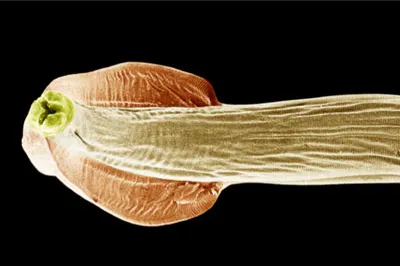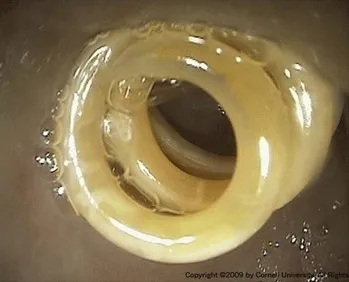Discovering that your beloved canine companion has roundworms can be unsettling, and a common, very natural concern quickly arises: if my dog has roundworm, will I get it? The short answer is yes, humans can indeed contract roundworms from dogs. This isn’t just a pet health issue; it’s a public health concern that every dog owner should understand. Roundworms are one of the most prevalent internal parasites affecting dogs, with nearly all puppies becoming infected at some point. These resilient parasites can spread easily and are surprisingly difficult to completely eradicate from the environment, making awareness and proactive prevention crucial for both your dog’s health and your family’s safety.
What Are Roundworms and How Do Dogs Get Them?
Roundworms, primarily Toxocara canis in dogs, are spaghetti-like intestinal parasites that live in the digestive tract. They are incredibly common and can infect dogs in several ways, highlighting why prevention is so important.
The most frequent method of transmission is from mother to puppy. Puppies can be infected with roundworm larvae while still in the womb. After birth, they can also ingest larvae through their mother’s milk. This early life exposure means virtually all puppies are at risk. Additionally, dogs can become infected by ingesting microscopic roundworm eggs present in contaminated soil or feces from another infected animal. These eggs are remarkably hardy and can survive in the environment for years. Another less common, but significant, route of infection is when a dog eats a “transport host” – a small mammal like a mouse, rabbit, or bird – that has ingested roundworm eggs, carrying the larvae in its tissues.
Recognizing Roundworm Symptoms in Your Dog
While many adult dogs with mild roundworm infections may show no obvious signs, heavy infestations, especially in puppies, can lead to noticeable health problems. Adult roundworms reside in the intestines, absorbing nutrients meant for your dog, which can lead to malnutrition and other issues.
Common symptoms of roundworm infection in dogs include:
- Diarrhea: Often soft stools, sometimes containing visible worms.
- Vomiting: Your dog might vomit up live worms, which look like white or light brown spaghetti.
- Weight loss: Despite eating normally, an infected dog may appear thin.
- Dull coat: A lack of nutrients can lead to a rough, unhealthy-looking coat.
- Potbellied appearance: This is a classic sign in puppies with heavy worm burdens, where their abdomen appears distended.
- Coughing: In some cases, migrating roundworm larvae can cause irritation in the lungs, leading to a cough.
You might directly observe adult roundworms in your dog’s feces or vomit. They are typically white or light brown and can range from a few inches to several inches long. If you notice any of these signs, it’s essential to contact your veterinarian promptly for diagnosis and treatment.
Effective Prevention and Treatment for Your Canine Companion
Preventing roundworm infection in your dog involves a multi-faceted approach, focusing on hygiene, regular deworming, and veterinary care. Keeping your dog’s living environment clean is paramount; regular removal of feces from your yard or litter box is crucial to prevent the accumulation of infective eggs. Additionally, discouraging your dog from hunting and consuming wild animals can help break the cycle of infection through transport hosts.
For puppies, a rigorous deworming schedule is vital due to their high susceptibility and the risk of prenatal or lactational transmission. Puppies should be treated for roundworms at 2, 4, 6, and 8 weeks of age, followed by a monthly preventive treatment. Nursing mothers should also receive monthly preventive care alongside their puppies to minimize transmission risk. Regular fecal (stool) examinations are recommended 2 to 4 times during a puppy’s first year and 1 to 2 times annually for adult dogs to monitor for parasites. Many broad-spectrum parasite preventives, including certain all in one flea and wormer for dogs products and even some heartworm medication for dogs over the counter, also effectively control roundworms. Always consult your veterinarian to determine the most appropriate prevention and treatment plan for your dog, especially if you observe puppies having blood in stool after deworming, which could indicate underlying issues or a strong parasite burden.
If My Dog Has Roundworm, Will I Get It? Understanding the Zoonotic Risk
This is the most critical question for many pet owners, and the answer is a definitive yes – humans can become infected with roundworms from their dogs. The medical term for human infection with Toxocara canis is toxocariasis, and it poses a significant public health risk. So, what worms can you catch from dogs? Roundworms, specifically.
Humans primarily contract roundworms by accidentally ingesting microscopic roundworm eggs that have been shed in dog feces and are present in contaminated soil. These eggs are not immediately infective when passed in feces; they need time (usually several weeks) in the environment to mature into an infective stage. Once mature, they are highly resilient and can persist in soil for many years.
After ingestion, the roundworm larvae hatch in the human intestine. Unlike in dogs, these larvae cannot complete their life cycle to become adult worms in humans. Instead, they migrate throughout the body, causing various health problems depending on where they settle. This condition is known as larva migrans.
There are two main forms of larva migrans in humans:
- Visceral Larva Migrans (VLM): The larvae travel to internal organs such as the liver, lungs, heart, or brain. Symptoms can range from mild (fever, cough, abdominal pain) to severe, potentially causing organ damage, neurological issues, or even seizures if they reach the brain.
- Ocular Larva Migrans (OLM): The larvae migrate to the eye, causing inflammation and potentially leading to vision loss or even blindness in the affected eye. OLM is more common in younger children.
Children are particularly susceptible to infection because they often play in soil, sandboxes, and yards where dogs may defecate, and they are less diligent about hand hygiene.
 Close-up microscopic view of a dog roundworm (Toxocara canis) segment
Close-up microscopic view of a dog roundworm (Toxocara canis) segment
Protecting Your Family: Preventing Human Roundworm Infection
Given the serious health risks, protecting your family from canine roundworms is essential. The good news is that with proper precautions, the risk of human infection can be significantly minimized.
Here are key strategies for prevention:
- Maintain Strict Hygiene: Always wash your hands thoroughly with soap and water after handling dog feces, playing with your dog, or gardening, especially if the soil might be contaminated. Wearing gloves when gardening or cleaning up pet waste is also recommended.
- Prompt Fecal Removal: Immediately pick up and dispose of your dog’s feces from your yard, public parks, and any other areas where pets frequent. This prevents roundworm eggs from maturing and contaminating the environment.
- Regular Pet Deworming: Ensure your dog is on a consistent deworming schedule recommended by your veterinarian. This is the single most effective way to reduce the number of infective eggs shed into the environment. Discuss with your vet about comprehensive parasite control options, including over the counter flea meds for dogs that might offer broader protection.
- Supervise Children’s Play Areas: Prevent children from playing in areas known to be frequented by dogs, especially if feces are often present. Ensure sandboxes are covered when not in use to prevent outdoor cats and dogs from contaminating them.
- Discourage Pica: Prevent your dog from eating dirt or small animals, as these can be sources of infection.
- Educate Family Members: Ensure everyone in your household understands the risks and the importance of hygiene.
By taking these preventative steps, you can create a safer environment for both your dog and your family.
 Animated GIF showing adult roundworms within a dog's intestine
Animated GIF showing adult roundworms within a dog's intestine
Conclusion
The question “If My Dog Has Roundworm Will I Get It?” highlights a crucial aspect of responsible pet ownership: understanding and mitigating zoonotic disease risks. While roundworm infection in dogs is common, particularly in puppies, the potential for human infection with Toxocara canis (toxocariasis) is a serious concern, capable of causing significant health problems like visceral and ocular larva migrans. By adhering to a strict deworming schedule for your dog, maintaining excellent hygiene practices, and ensuring a clean living environment, you can effectively protect your entire family from these persistent parasites. Always consult your veterinarian for the most accurate diagnosis, treatment, and preventive care tailored to your dog’s specific needs. Prioritizing your dog’s health directly contributes to your family’s well-being.
References:
- Companion Animal Parasite Council (CAPC). Ascarids (Roundworms) – Dogs. Available at: https://www.capcvet.org/guidelines/ascarid/
- Centers for Disease Control and Prevention (CDC). Toxocariasis. Available at: https://www.cdc.gov/parasites/toxocariasis/index.html
